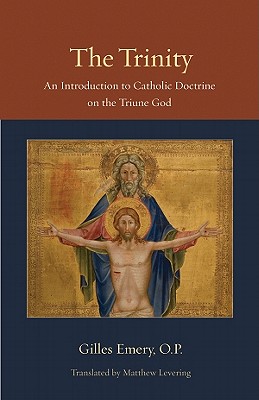
Emery, Gilles
product information
description
scholarship, Gilles Emery offers a much-anticipated introduction to Catholic doctrine on the Trinity. His extensive research combined with lucid prose provides readers a resource to better understand the foundations of Trinitarian reflection. The book is addressed to all who wish to benefit from an initiation to Trinitarian doctrine.
The path proposed by this introductory work comprises six steps. First the book indicates some liturgical and biblical ways for entering into Trinitarian faith. It then presents the revelation of the Father, Son, and Holy Spirit in the New Testament, by inviting the reader to reflect upon the signification of the word "God." Next it explores the confessions of Trinitarian faith, from the New Testament itself to the Creed of Constantinople, on which it offers a commentary. By emphasizing the Christian culture inherited from the fourth-century Fathers of the Church, the book presents the fundamental principles of Trinitarian doctrine, which find their summit in the Christian notion of "person."
On these foundations, the heart of the book is a synthetic exposition of the persons of the Father, the Son, and the Holy Spirit in their divine being and mutual relations, and in their action for us. Finally, the last step takes up again the study of the creative and saving action of the Trinity: the book concludes with a doctrinal exposition of the "missions" of the Son and Holy Spirit, that is, the salvific sending of the Son and Holy Spirit that leads humankind to the contemplation of the Father.
The path proposed by this introductory work comprises six steps. First the book indicates some liturgical and biblical ways for entering into Trinitarian faith. It then presents the revelation of the Father, Son, and Holy Spirit in the New Testament, by inviting the reader to reflect upon the signification of the word "God." Next it explores the confessions of Trinitarian faith, from the New Testament itself to the Creed of Constantinople, on which it offers a commentary. By emphasizing the Christian culture inherited from the fourth-century Fathers of the Church, the book presents the fundamental principles of Trinitarian doctrine, which find their summit in the Christian notion of "person."
On these foundations, the heart of the book is a synthetic exposition of the persons of the Father, the Son, and the Holy Spirit in their divine being and mutual relations, and in their action for us. Finally, the last step takes up again the study of the creative and saving action of the Trinity: the book concludes with a doctrinal exposition of the "missions" of the Son and Holy Spirit, that is, the salvific sending of the Son and Holy Spirit that leads humankind to the contemplation of the Father.
member goods
No member items were found under this heading.
Return Policy
All sales are final
Shipping
No special shipping considerations available.
Shipping fees determined at checkout.







